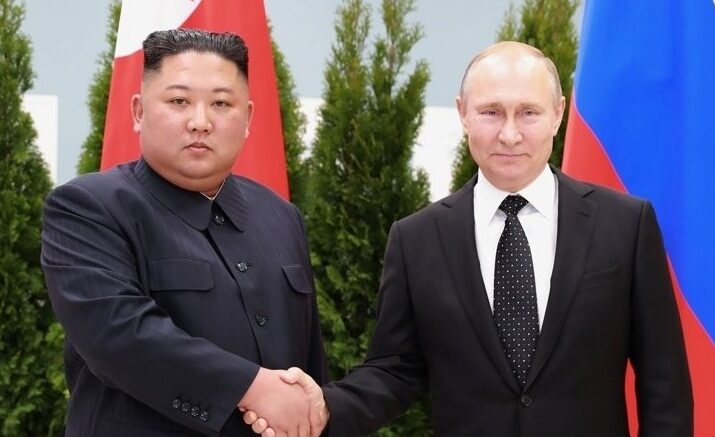In a significant geopolitical development, Russian President Vladimir Putin has approved a comprehensive strategic partnership treaty with North Korea, signaling a deeper alignment between Moscow and Pyongyang. This partnership represents a notable shift in the regional power dynamics of Northeast Asia, with potential implications for both regional security and international relations. The treaty aims to strengthen diplomatic, military, and economic cooperation between the two nations, fostering a closer relationship in response to shared strategic interests.
1. The Strategic Significance of the Partnership
The treaty aligns with Russia’s broader strategic goals of counterbalancing Western influence and strengthening alliances with nations in Asia. By deepening ties with North Korea, Russia is potentially gaining leverage in regional matters that involve the United States and its allies in South Korea and Japan. For North Korea, the treaty provides an opportunity to mitigate its international isolation and gain access to Russian resources, technology, and support.
The partnership also strengthens Russia’s influence on the Korean Peninsula, where North Korea’s strategic location holds significance. The treaty is anticipated to cover various forms of cooperation, including security agreements, economic support, and cultural exchanges.
2. Key Areas of Cooperation Under the Treaty
While full details of the treaty have not been disclosed, key areas of collaboration likely include:
- Military and Security Cooperation: The treaty is expected to enhance military collaboration, potentially involving joint exercises, intelligence sharing, and training programs. This cooperation aligns with both countries’ efforts to boost their defense capabilities amid escalating tensions with Western nations.
- Economic Development and Trade: Russia has historically provided energy resources to North Korea, and this partnership could deepen economic exchanges. Despite international sanctions on North Korea, the treaty may pave the way for economic aid, resource sharing, and infrastructure projects in North Korea, likely involving Russian expertise.
- Technology and Energy: Energy partnerships could be a central aspect of this treaty, given North Korea’s chronic energy shortages. Russia’s vast energy reserves may help supply North Korea with essential resources such as fuel and power, while collaboration on technology could help North Korea in areas such as communications and energy efficiency.
- Cultural and Educational Exchanges: In addition to strategic cooperation, the treaty likely includes cultural and educational exchanges to foster goodwill and mutual understanding between the Russian and North Korean populations. This could involve student exchange programs, cultural events, and academic partnerships.
3. Broader Implications for International Relations
The Russia-North Korea partnership may further strain relations between Moscow and Washington, particularly as the United States and its allies closely monitor developments in Northeast Asia. As both nations have faced increasing isolation and sanctions from the West, the alliance provides them with mutual support against global pressures. It also sends a message to the international community about Russia and North Korea’s ability to circumvent traditional diplomatic isolation by establishing a counter-aligned bloc.
For China, which also has a vested interest in North Korea, the treaty may lead to further discussions with Russia about coordinated approaches to North Korea and potential strategic alliances in the Asia-Pacific region.
4. Potential Concerns and Criticisms
The partnership has raised concerns in the West, particularly around the potential for military and nuclear technology transfers. Russia, as a permanent member of the United Nations Security Council, has previously joined sanctions on North Korea, but this partnership could lead to a reassessment of its position on sanctions enforcement.
Critics argue that this treaty could destabilize the already fragile situation on the Korean Peninsula. South Korea and Japan, key U.S. allies in the region, may view the treaty as a threat to regional security, leading to heightened diplomatic and military measures in response. The potential for increased arms transfers and military collaboration is likely to prompt calls for greater defense coordination among U.S.-aligned countries in the region.
5. A Strategic Move Amid Shifting Alliances
Russia’s partnership with North Korea reflects a broader trend of shifting alliances in global politics. Facing ongoing international sanctions and economic isolation, Russia has sought to deepen its relationships with non-Western nations, including North Korea, Iran, and China. North Korea, on the other hand, benefits from the partnership by gaining access to critical resources and a powerful ally to counterbalance Western pressures.
This treaty underscores how Russia is recalibrating its foreign policy amid its complex relationship with the West, using partnerships with countries like North Korea to reinforce its geopolitical influence and signal its independence from Western diplomatic pressures.
Conclusion
The newly approved comprehensive strategic partnership treaty between Russia and North Korea marks a significant shift in Northeast Asian geopolitics. With potential implications for military, economic, and political relations in the region, the alliance adds complexity to the international landscape as Russia and North Korea draw closer in response to shared pressures. As the world watches this partnership unfold, it could redefine power dynamics in the Asia-Pacific and heighten tensions between Russia and Western allies.











